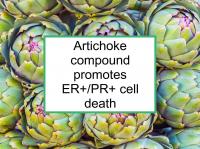Artichokes are a good dietary source of apigenin, luteolin, silibinin and other compounds with chemopreventive properties. Artichoke extract has been shown to inhibit proliferation and induce apoptosis (programmed cell death) in triple negative (ER-/PR-/HER2-) breast cancer cells in the laboratory.
Apigenin and luteolin have been shown to induce apoptosis across a variety of breast cancer cell lines. Silibinin has been shown to induce cell death in both triple negative and hormone receptor positive (ER+/PR+) breast cancer cells. Silibinin has also been shown to reduce the degree of stem cell-like properties of clusters of triple negative cells. In addition, silibinin has been shown to suppress ER+/PR+ cell migration. Now a new study has reported a mechanism of action by which silibinin induces ER+/PR+ breast cancer cell death.
Milk thistle extract and silymarin supplements not recommended
Like artichokes, milk thistle (Silybum marianum) is a member of the thistle family. This herb traditionally has been used for its liver-protective properties, but increasingly is being used by cancer patients. Milk thistle is a source of the complex flavonoid compound silymarin, which contains silibinin, silybin, silicristin, silidianin and related compounds. Silibinin is the most biologically active component of silymarin.
Silymarin has been shown to inhibit growth and induce apoptosis in various breast cancer cell lines, as well as mammary tumors in a mouse model of HER2 overexpressing (HER2+) breast cancer. Silymarin has been shown to have a synergistic effect with doxorubicin, increasing its treatment effects. However, one study found that treatment of human breast cancer tumor grafts in rodents with silymarin isolated from milk thistle stimulated tumor growth. Therefore, we caution breast cancer patients, survivors and those at high risk against taking concentrated milk thistle, silymarin or artichoke supplements.
Latest research: Silibinin causes cell death by downregulating ERα
The study referenced at the beginning of this news story was designed to investigate how silibinin induces programmed cell death (apoptosis) in hormone receptor positive MCF-7 breast cancer cells. There are two types of estrogen receptors: estrogen receptor alpha (ERα) and estrogen receptor beta (ERβ). Some compounds that bind to ERα do not bind to ERβ and vice versa. Both types of estrogen receptor are therapeutic targets in breast cancer. Activation of ERα can trigger a series of downstream signaling pathways. Previous studies have reported that silibinin induces apoptosis in MCF-7 cells. In the current study, the authors show that silibinin leads to MCF-7 cell death through the downregulation of ERα expression.
Caspases are enzymes involved in the initiation and execution of apoptosis. Silibinin was found to cause apoptosis of MCF-7 cells by means of upregulation of caspase 6 to ERα. Silibinin also upregulated autophagy (a type of cell self-digestion), which served to increase apoptosis. The authors showed that silibinin inhibited the expressions of Akt/mTOR (which accounted for the induction of autophagy) and extracellular-signal-related kinase (ERK) (which accounted for the induction of apoptosis). Co-treatment with an ERα inhibitor heightened these effects. The authors conclude that treatment of ERα-positive MCF-7 cells with silibinin downregulates the expression of ERα, leading to induction of autophagy and apoptosis.
Please see our articles on artichokes and what ER+/PR+ breast cancer patients and survivors should eat for more information.
